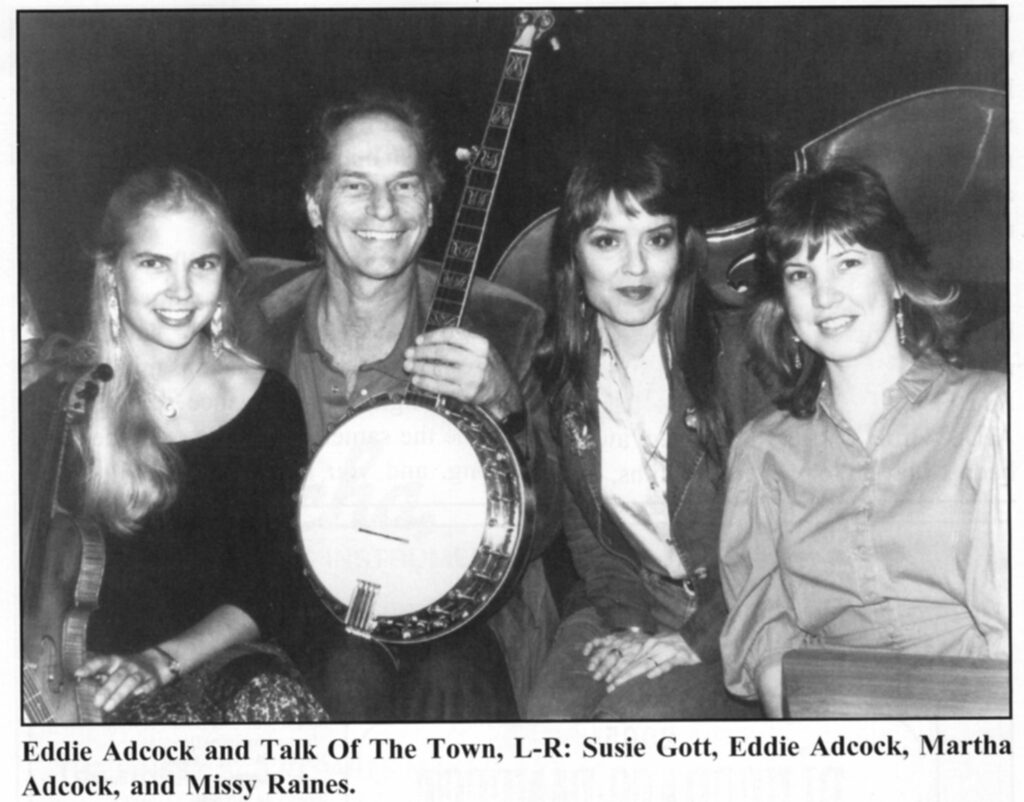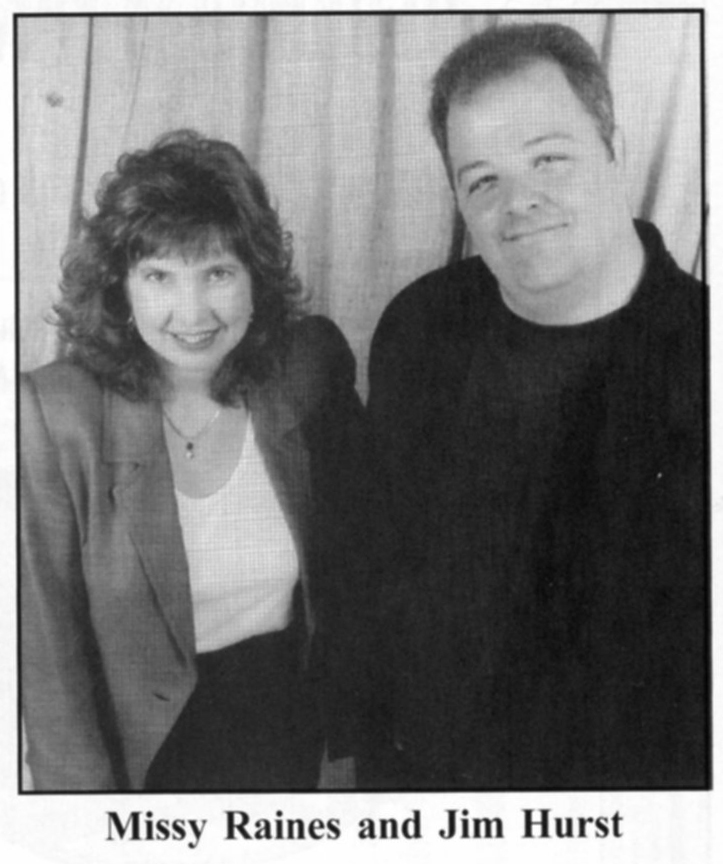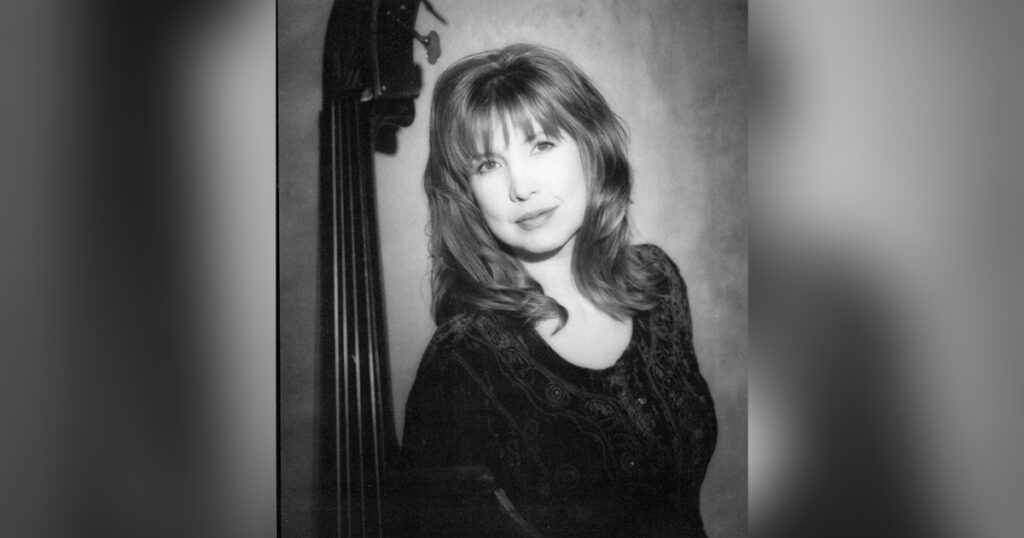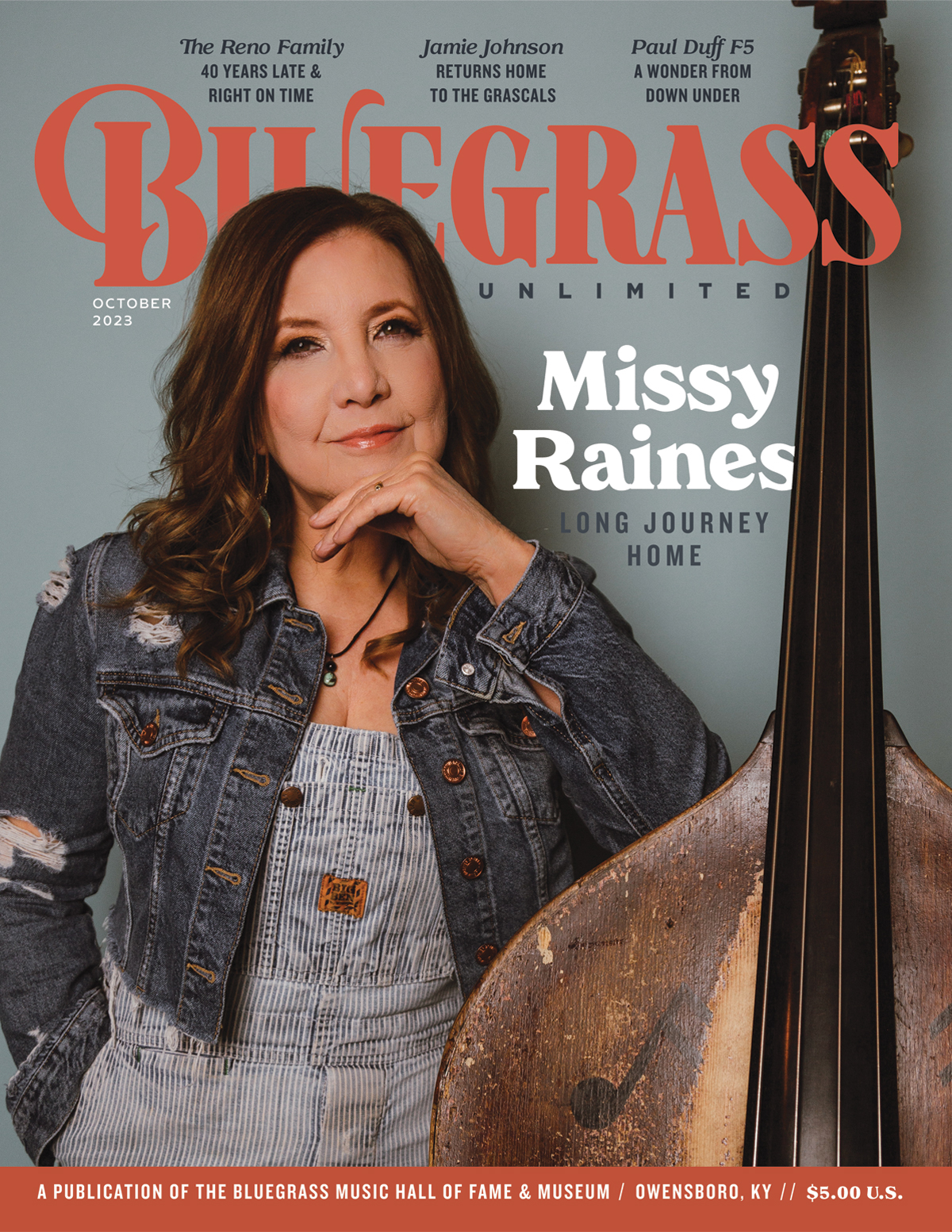Home > Articles > The Archives > A Leap of Faith for Missy Raines
A Leap of Faith for Missy Raines
Reprinted from Bluegrass Unlimited Magazine
October 2005, Volume 40, Number 4
It has taken two decades, but bass player maestro Missy Raines is finally ready. “It’s terrifying,” the five-time IBMA Bass Player Of The Year confesses of her bold move to transition from bandmember to bandleader. “I have always wanted to do this, for twenty years at least. I thought, ‘Someday, I would love to have my own band.’ But the difference was then I knew in my heart I wasn’t ready, and I knew I didn’t have yet what it would take to do it.”
In the meantime, Raines built an impressive resume through the years, working for bluegrass greats like Eddie Adcock and Claire Lynch. With experience came confidence and the decision to spread her wings for a solo flight. “I’m just a real late bloomer,” she said. “And I just have to go about things really slowly and evolve to them and hopefully. I’ll live long enough,” she adds with a laugh.
Raines began branching out to her ultimate dream spot when she formed a duo with guitarist Jim Hurst. Investing fifty percent in the partnership, she was forced to decrease her liabilities and increase her assets. “I was terrified to sort of step up from the back line of the bass role and be in the front and talk in a mic and know that I had to come up with fifty percent of the energy for this,” Raines said. “But I learned a lot doing that. It’s not nearly as scary as it would have been if I hadn’t spent the last several years doing this with Jim. More than anything it’s just really exciting.”
Taking stock of her life over the last few years with the passing of her parents, Raines decided to grab firmly to the reins and make her vision a reality. “If I can see myself doing it in my head, I know that it will happen. It’s just a matter of time. I’ve always been able to see me doing this. So, I knew it was going to happen.”
While recovering from hip replacement surgery earlier this year, Raines started putting together her own band and working on her second solo CD. It is scheduled for release in spring of 2006.
“It’s very much like when Jim and I started our thing. I didn’t quite know what we were going to do, but I knew I had to do it. I see it so very clearly in my head and hear it in my head—just going through that very laborious, creative process of it sort of being purged out. It’s painful and frustrating and exciting all at the same time.”
Raines has come a long way from her childhood days in Short Gap, W.Va., where she grew up listening to her parents’ bluegrass records and attending bluegrass festivals around the four-state area. “I just can’t remember a time when I didn’t know what bluegrass was. I was around other musicians and started playing piano and started playing guitar.” But when her father wanted to learn to play bass, Raines’ curiosity got the best of her.
“He had sort of been fooling around with a washtub and decided he might try his hand at a bass. He just came home when I was about 11 or 12 with this bass for himself, but it was in the house, and I couldn’t resist. I started playing it shortly after that. It was probably as much novelty as anything. I was very infatuated with all kinds of music, and I had been playing guitar and jamming with folks locally. I had never even been close to one before. The bass is an easy instrument to learn a few things on real quickly and kind of join in and I was able to do that because I could watch the guitar, and I knew what chords they were playing. So, I could follow along, and everyone loved it.”
Raines’ older siblings, two brothers and a sister, were more interested in genres like classical, pop, and southern rock. Bluegrass whetted Raines’ musical appetite until she heard the music of Dave Grisman a few years later. “That sort of opened this whole door of, like, the jazz world to me. I was definitely still into bluegrass, but I was just then starting to think about jazz as well. There was this album that came out a little later with Sam Bush, Tut Taylor, Norman Blake, Vassar Clements, and David Holland, who’s a very famous jazz bassist. That record really changed my life a lot, too. He was playing with these other people that I had been listening to all these years, and the way he did that—it just blew my mind and made me want to really explore different avenues of playing.”

Raines continued to explore jazz music, but she still had her heart in bluegrass. After graduating from high school, she got her first real taste of professional playing with the band Cloud Valley. “I had no idea the kind of work that went into it. I was totally naive. You had to have this disciplined practice schedule. You weren’t going to make any money, and the traveling—the driving and stuff— I didn’t anticipate any of it. I was with folks who were older than me, and they had some experience.
“Musically, I learned a lot because these guys were all learned musicians, and they all were either working on music degrees or had them already. I didn’t. I felt like I was treading water just to keep up with them, but I did. It was a real struggle.”
Eventually, the bandmembers parted ways, and Raines returned to college until she got a call from one of her musical idols, Eddie Adcock, to join his band. “My parents were original Country Gentlemen fanatics,” Raines recalls. “So, I had grown up with them, with Eddie Adcock, Tom Gray, John Duffey, and Charlie Waller on [the] stereo, and they were really kind of looked at as gods in my household,” she adds with a laugh.
“What was sad about it was once I started playing with him I realized that he was never going to receive the kind of acclaim that he really deserved because he was always so far out there and had always played outside the box—everyone thinking he should have gone right and he went left. He always made those kinds of choices because that’s the kind of person he is. Eddie cares a lot about doing the right thing, and he doesn’t care about money. That’s the biggest thing. He cares about music and all those things. It was really great to be with somebody like that.”
Unfortunately, one of her brothers became terminally ill, and Raines left the road to take care of him in 1994. Rick Raines died of complications from the AIDS virus. “After he passed away, I hadn’t played for several months, and I was looking to get back into the music. From the experience that I had been through with my brother. I was kind of looking at life a little differently. I really wanted an open-minded environment, and I wanted to explore all kinds of new things.”
Raines’ wish was fulfilled when she hooked up for a short time with an original, eclectic group named the Brother Boys. “They had this mindset that every night’s performance doesn’t have to be the same. You could take the same song, and you might perform it differently every night because of how you felt or because of what was going on in the room at the time. It was a very organic thing, almost to the point that we would saw the limb behind us, where we would get so free-form that it might fall apart, but then, it might not.
“I had not been exposed to that at all. I had been a part of people who wanted it to be a certain way. You practice so that it’s perfect, and you do it that way every time. That’s a really great thing. There’s nothing wrong with that. I didn’t take to it very well at first because it was very unnerving. In fact, I really kind of fought it. I think I evolved a little bit, in trying to see the beauty of it, that I started thinking this is a very cool form of art.”
Although it was a freeing experience creatively, art can’t always pay the bills. So, when Claire Lynch and the Front Porch String Band came into the picture, Raines said goodbye to the Boys. “Not only did I really truly love the music, but she was also offering me this really good paying gig. I honestly don’t think I would have taken it if I didn’t love the music as much. I had always been a fan of hers, and I loved the style of music that they were doing—contemporary, but it was still bluegrass. She is someone who wanted it to be the same way. She wanted it to be perfect, but it worked. So, it was another challenge for me to get to this point where I could pull off the material every night.”
In 2000, Lynch left the road. Raines and fellow bandmember, Jim Hurst, opted to form their own duo. “I think we thought about a band, but then we realized that would be really complicated, and it might be easier just to try the two of us. We knew we could play together, and we knew we were committed and could count on each other. I knew that I wanted to do something like that—I’d always wanted to have my own band and that was just sort of another step in that direction. And I think Jim has wanted that as well, his own band. We didn’t know if the bluegrass people would accept it at all, but they kind of have.”
The duo gave Raines yet another opportunity to flex her creative muscles. “I play completely differently if it’s just me and Jim than I would if it was in a whole band. In general, I’m probably going to play more, but not necessarily. A lot of times Jim and I end up improvising things a little bit through the night. Where one of us might take something a little place and the other say, ‘Oh, so you want to go there, huh?’ Then we play off of that and that would be extremely hard to do with more than just two people.”

Whether she’s part of a duo or band doesn’t matter to her peers who have chosen her the IBMA Bass Player Of The Year an impressive five times (1998, 1999, 2000, 2001, and 2004) during her career. “For years and years, I was nominated, but I never won, and I didn’t want to win because I didn’t think I deserved it. It’s not that I felt like I deserved it when I won it, but when I did win it, I said to myself, ‘They want me to have it.’ So, it meant a great deal. Before that, I thought, ‘Well, I’m a novelty. I’m a girl, whatever.’ But I don’t feel that way any more.”
As one of the few female figures in a male-dominated profession, Raines admits she’s had a few minor hurdles to cross. “I have suffered from some sexism, but to say that it’s been really horrible and bad…I’d feel kind of shameful to say that because there’s been others who’ve paid greater prices. Things have changed enough to where it hasn’t bothered me. Whatever things I’ve lost because of the woman thing, I haven’t even noticed. It’s given me some grit that I might not have had. I feel like, especially these days, the world is wide open and I still have some more years left. I feel like the door is pretty widely open.”
And she’s walking right through juggling a multitude of projects. She’s touring again with Claire Lynch while maintaining her partnership with Jim Hurst and forming her own band. After 25 years in the music business, Raines has enjoyed showers of blessings during her career.
“I have to honestly say I really couldn’t have expected more. I never dreamed that I would be recognized by my peers and that I would have had the opportunity to work with the kinds of players that I’ve worked with. I never would have dreamed that. So, I feel very lucky.”

